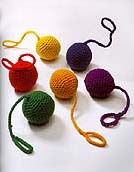


Given by the mother to the child in the first months of life, the first gift introduces the child to the sphere. The string enables the movement of the ball to be directed and controlled. This soft toy is the correct size for a baby to handle. The bright colors and movements of the balls attract the attention of the child and present endless possibilities for imaginative play.
The first gift introduces three aspects which are central to the gifts:
These colorful balls provide a structure for interaction between mother and child, which leads naturally to the child's free play. The sphere is presented as a solid which can be handled, rolled along a surface or moved through the air. The movement of the ball traces lines and circles as the sphere becomes a moving point. At rest the ball is the perfect sphere, representing unity. In motion it becomes a creative point able to trace any line or shape, on a surface or in the air.
Through directed play, highly trained teachers encouraged children to draw analogies between the knitted balls of the first gift and other forms, such as the body and other natural objects like nuts or the sun, and even abstract concepts, such as self, unity, perfection, and color. Froebel recognized that children began to learn as soon as they began to interact with the world, and he reasoned that since the interaction was mostly in the form of play, the way to educate children was through play:
Most people would not consider a ball to be a primitive plaything, but ancient Egyptian children played with balls. Made of intricate designs and of materials onhand (papayrus, reeds, ivory, gold, clay, and wood), the Egyptians were making balls as early as 1400 BC. Deerhide balls were also used by the Red Indian tribes of North America. The Celts of the ancient British Isles used bladders of sheep and goats to play an early form of soccer. The Japanese still produce a simple ball made from tissue paper tightly bound with string. Malaysians make bouncing balls from split cane. Ball games were and are considered games of skill and sport for all ages. All people from different lands have, in some form, the ball in their heritage. The round shape of a ball is a universal concept. Does this make the ball the original toy? The earliest plaything?
Copyright © 1998-2000 Froebel Web All Rights Reserved. froebelweb@yahoo.com
http://geocities.datacellar.net/froebelweb/gifts/first.html